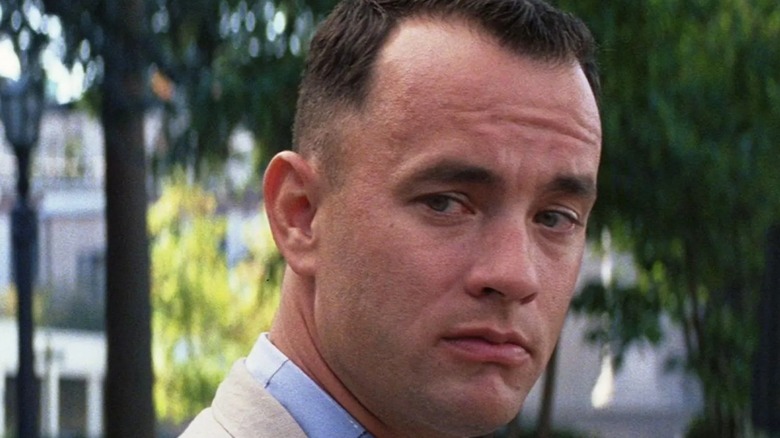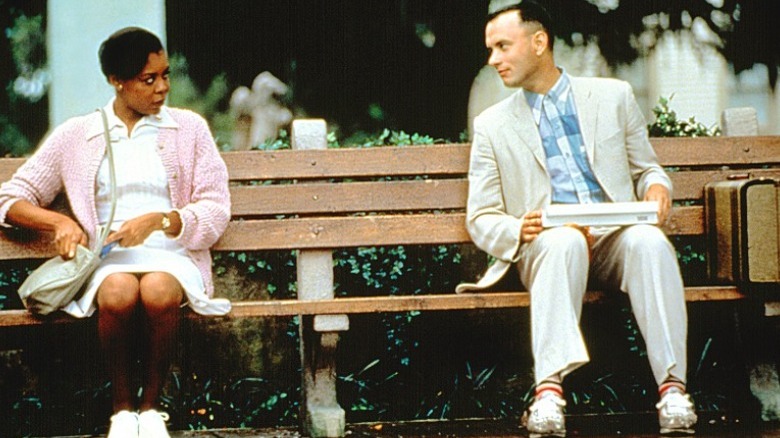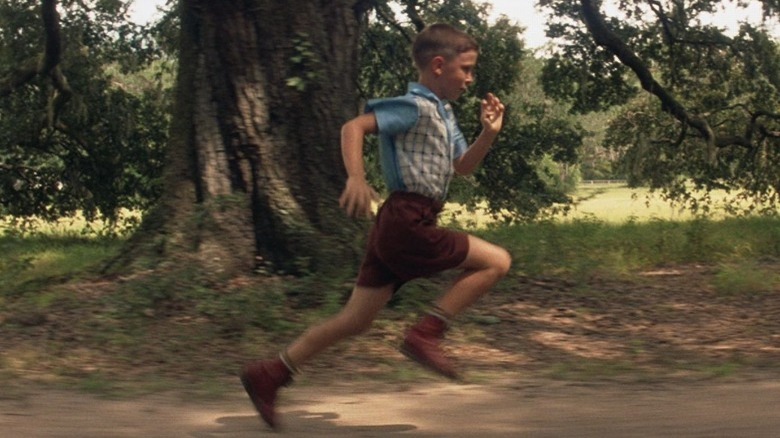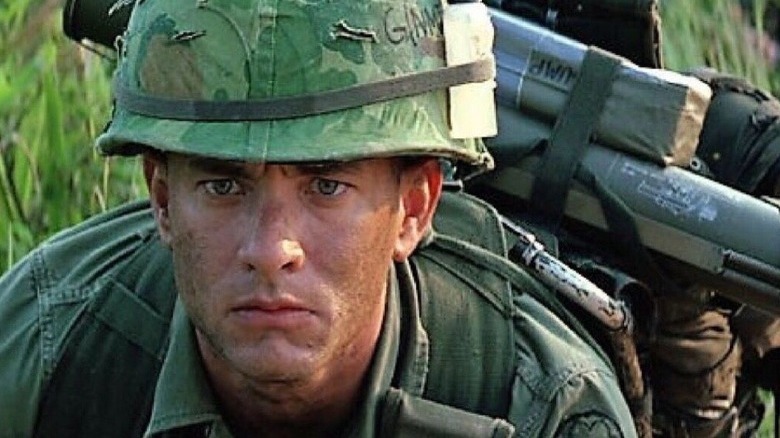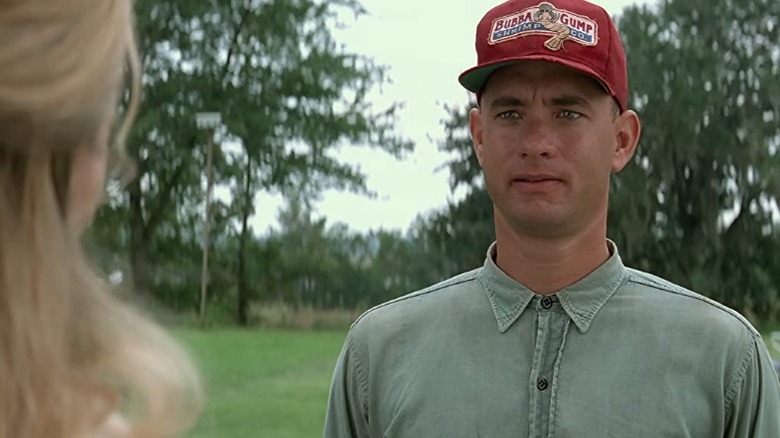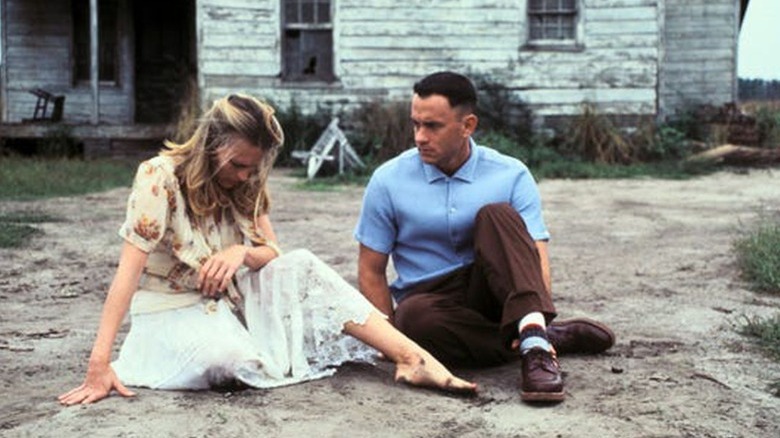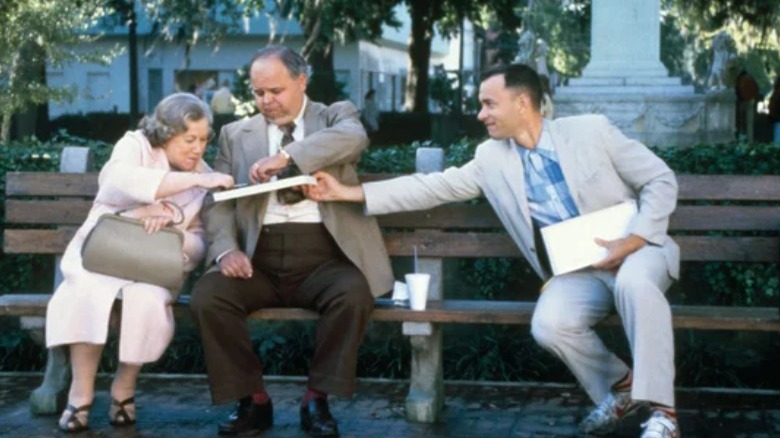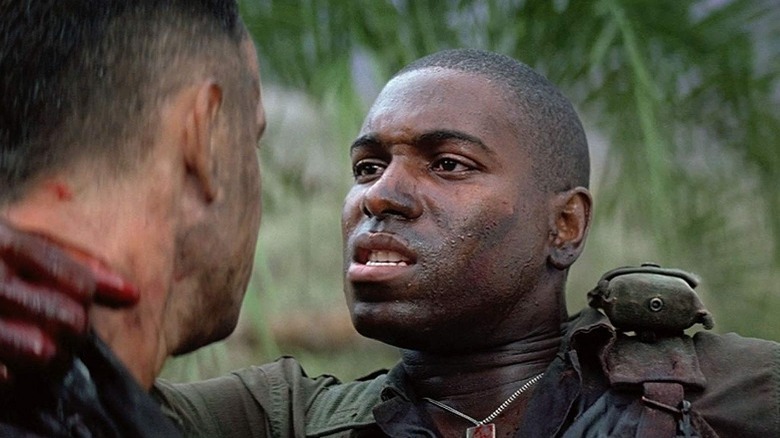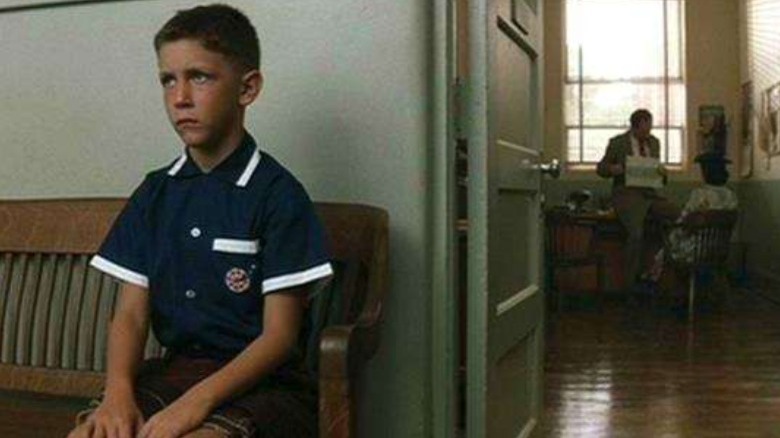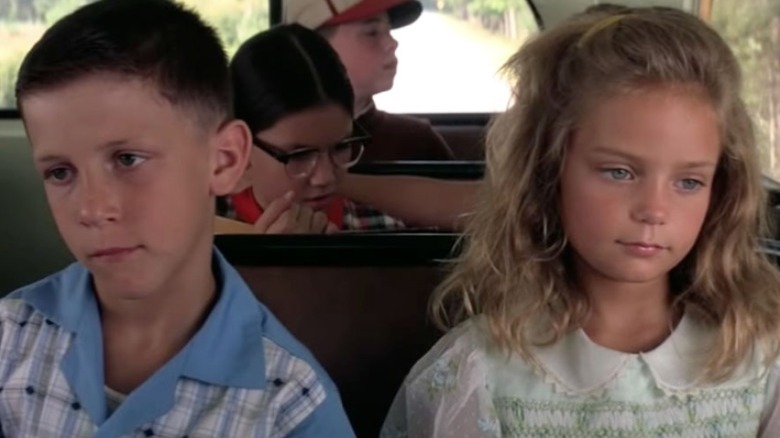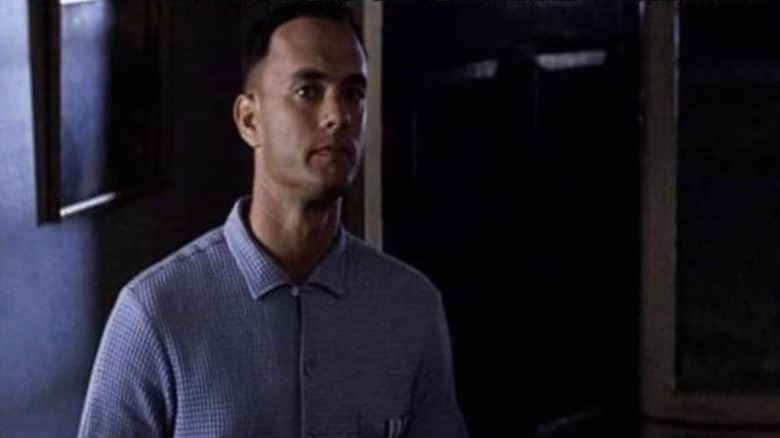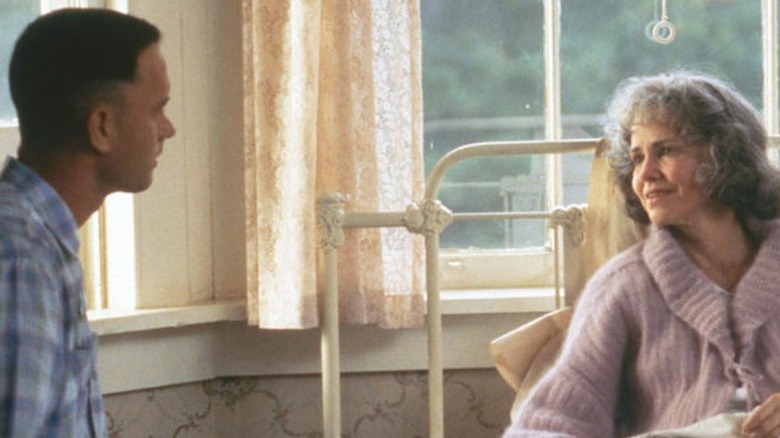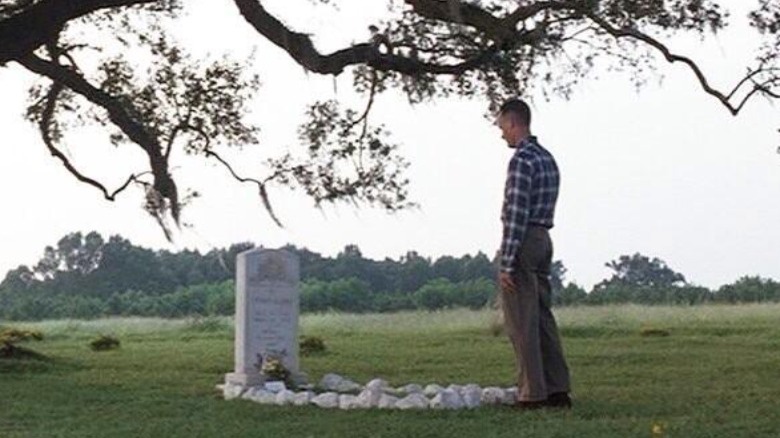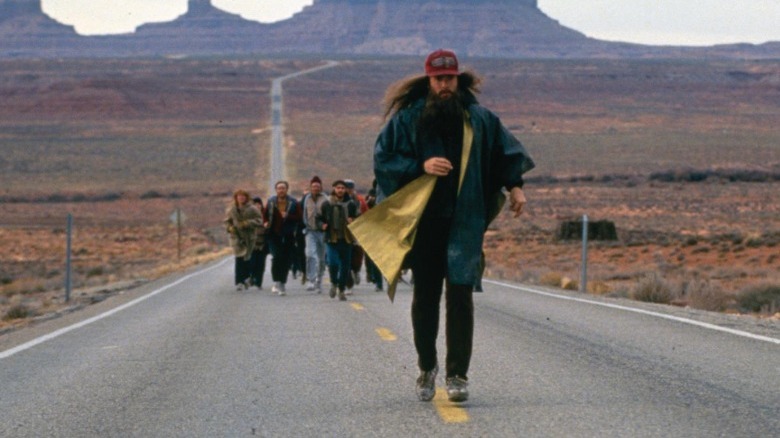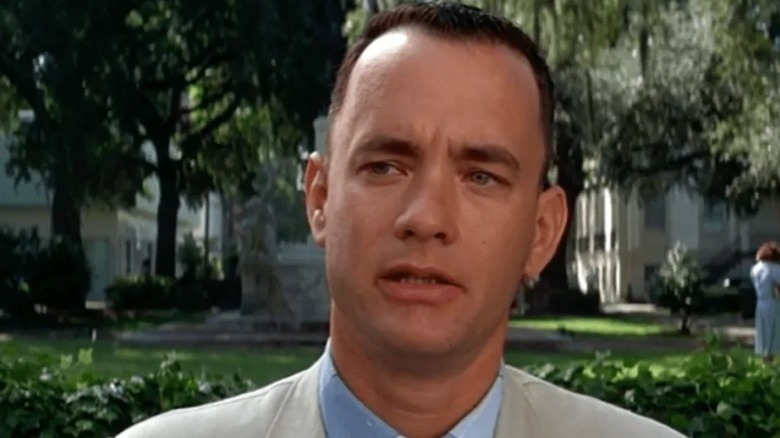The Best Forrest Gump Quotes You'll Likely Never Forget
Somewhere in the heart of Alabama, a young Forrest Gump shares a seat on a tree branch with the most special person in his world, Jenny Curran. Over the years, Forrest would touch the lives of many, but always carry that same deep and abiding fondness for his childhood love.
"Forrest Gump" is a tale for the ages. Based on the 1986 Winston Groom novel of the same name, director Robert Zemeckis brought the lovable, innocent mind of Forrest (Tom Hanks) to countless screens across the world. Unshackled by the inhibitions limiting most of us through established social graces, Forrest pioneers a life that takes him places. Ultimately, his life influences those he comes into contact with, helping them become the best they can be.
Throughout the film, many mock Forrest for his seemingly simple mind. Yet, most don't understand that the phrase "simple-minded' isn't the insult they think it is. Forrest is as innocent and genuine as a child. He doesn't have overbearing ambitions or his heart set on wild achievements or successes. He just wants to live life with those he cares about — a simple life.
When Lieutenant Dan (Gary Sinise) tells Forrest he's rich after Dan invested Forrest's money in Apple, Forrest smiles at the idea that money is one less thing he has to worry about. Riches and the complexities that life can bring have no sway over Forrest. As such, a man who seems to be of low intellect to many is actually one who sees life far more clearly than most of us. As a result, his words carry a profundity that rival some of the world's most notable philosophers. Let's examine some of Forrest's best quotes, from a film we won't soon forget.
A person's shoes
From the onset of the movie, Forrest Gump can be seen cracking open his mother's book of Southern wisdom as he compliments the shoes of the lady sitting on the bench alongside him. Noticing how clean and comfortable her shoes must be, Forrest proclaims: "Mama always said there's an awful lot you can tell about a person by their shoes. Where they're going, where they've been. I've worn lots of shoes."
Sometimes it's difficult to know whether Forrest truly grasps the figurative or symbolic nature of his literal speech. While the character has certainly "worn" many pairs of shoes, he's also been on several adventures across multiple occupations. It's the very saga he's about to unravel for any would-be listeners at the bus stop. And as viewers will see, Forrest must burn through a decent number of soles traveling on foot as much as he does. Running for three years likely added greatly to that shoe count.
Run, Forest! Run!
There's a running theme throughout the film concerning the very act of ... well, running. It all begins when young Forrest is encouraged by Jenny to sprint away from his bullies. He breaks through the braces that are restraining him, and he runs like the wind. "Run, Forest! Run!" Jenny (Robin Wright) can be heard screaming from behind. Incidentally, running from her problems becomes a major aspect of Jenny's life as she bounces from place to place, becoming a vagrant.
Often, Forrest would embrace the idea of running, but not for the same reasons as Jenny. "I just felt like runnin'," he'd later say in life as he hit the country roads. To Forrest, running represents freedom. As a boy, his leg braces contained his free spirit until the day he shred them to pieces, bolting down that dusty road. Forrest proudly exclaims to the woman on the bench as he tells that story, "Now you wouldn't believe me if I told you, but I could run like the wind blows. From that day on, if I was goin' somewhere, I was runnin'!"
Running would serve Forrest well in the years to come. It'd get him out of hot spots in the Vietnam war and enabled him to save many lives from being lost. Running would always mean something far different to Forrest than it did for Jenny.
Where's Charlie?
Right after Forrest completed college, he was recruited into the United States military during the Vietnam conflict. He was deployed alongside his newfound best friend Bubba (Mykelti Williamson), who was drafted. During his stay in Vietnam, Forrest indicated that it was a world unlike anything you had known before, aside from the beer and barbecues put on by the soldiers. Rain would last for months, and he often didn't fully understand the rather ambiguous objectives of his platoon. Lieutenant Dan Taylor was his commanding officer and left Forrest and Bubba with two rules: they must take care of their feet and not do anything stupid that will get them killed.
Out on patrol, the unit would often stop when Lieutenant Dan became suspicious of the road ahead. He'd frequently order the soldiers to lay low so he could scope things out. Puzzled by the ultimate goals of the military in Vietnam, Forrest stated during his narration of the events: "We was always taking long walks, and we was always looking for a guy named Charlie." Of course, Charlie is the codeword for the enemy, unbeknownst to Forrest. Regardless, his observations were also a greater commentary on the United States' role in the conflict as a whole, one that seemed aimless and was ultimately futile.
Stupid
Most people underestimated Forrest and his insight. As a youngster, he had what was deemed a low IQ. He'd often seem narrow-minded as most societal norms seemed to elude him or fly right over his head. Socially, Forrest wasn't exactly a charmer or overly talkative. Many folks would then pose the question, "are you stupid or something?" Later in the film, Forrest would acknowledge that people's assumption that he is stupid always cut rather deep, even if he didn't show it on the outside.
However, Forrest would have a rebuttal for those who mocked his intellect. Casually, he'd explain that his mama taught him that "Stupid is as stupid does." While the quip might seem innocent on the surface, it could imply that those who mock him can also be just as stupid as they perceive him to be.
In essence, Forrest challenges the idea that he's stupid by showing a life worth of experiences as evidence he's not. After all, he could be laughing all the way to the bank with the big money he's made with his shrimping business and Apple investments, if he were that kind of person.
Where's a rock when you need one?
As Jenny is known to do, she swoops in and out of Forrest's life on a whim, constantly bringing him joy followed by sadness over her departure. At one point later in the film, she stays with Forrest for a period of time and the two bond once again just like they did when they were youngsters. Jenny teaches Forrest how to dance, and they take long walks together while Forrest tells her about his exploits in the war, as a shrimp boat captain, and other life adventures.
One day, Jenny and Forrest manage to come across her old childhood home. The painful memories of abuse at her father's hands come rushing back into her mind as she bitterly begins chucking rocks at the house in a burst of emotions. She eventually runs out of rocks and collapses to the ground in defeat. As Forrest sits next to her in the dirt, he states in his narration of the moment: "Sometimes, I guess, there just aren't enough rocks." Once again, a literal statement poignant and profound in its simplicity.
A box of chocolates
Perhaps the most famous quote to spin out of the 1994 film is Forrest's citation of his mother, who would say "Life is like a box of chocolates; you never know what you're going to get."
In the film, she uses this analogy when Forrest asks her what his destiny is. Of course, it is a path he must find for himself, and sometimes, it might be the most unexpected journey. Of course, this quote is a remarkable theme for the entire film as Forrest doesn't always know what crazy new adventure he'll encounter. But, like the feather in the wind, he manages to find new paths forward nonetheless.
"Forrest Gump" heavily correlates with the theme of pondering life's grand purpose. Each character is either haunted by the idea of a fleeting destiny, or they've determined in their minds what their chosen path was always meant to be, even when life deals a different hand. Jenny always envisioned herself being a singer. She never attained that goal, instead becoming a mother. Lieutenant Dan believed he was fated to die on the battlefield and bitterly rejected his savior, Forrest, for preserving his life. Eventually, he found a life worth living and offered Forrest proper gratitude. Bubba aimed to become a shrimp boat captain. But life can be cruel, and his was tragically cut short by the war. Life's design truly does feel like a randomized box of chocolates.
A true friend
Forrest became well-acquainted with the sometimes rude, dismissive nature of humanity as a child. Quickly, he learned that a friend can be found in someone who is open and non-judgmental. With the sweet utterance of young Jenny's offer to let Forrest sit next to him on the school bus, Forrest had found his first lifelong friend. No one else on the bus was prepared to let him sit next to them.
He experienced a bit of a throwback to that moment when he got on the bus to head for basic training in the military. New recruits callously dismissed him, but the soft-spoken Bubba offered Forrest a seat next to him. All of a sudden, a second friendship blossomed. Forrest was pleased that Bubba gave him the time of day, even if his newfound friend couldn't stop obsessing over shrimp. To seal their friendship, Bubba asked Forrest to become a partner with him in the shrimping business after the war, and Forrest agreed. Tragically, a firefight broke out on the battlefield and Forrest frantically searched the jungle for his best friend. Forrest acknowledged, "Bubba was my best good friend. And even I know that ain't something you can just find around the corner."
Forrest cherished his relationships far more than any material possession. He understood the beauty of human connection, which made the loss of Bubba all the more tragic.
Normal
Forrest is anything but normal. After all, isn't being normal a bit boring? In the opening moments of the film, Ms. Gump (Sally Field) is brought into the principal's office at Forrest's school. He explains to her that Forrest is not very bright, something she obviously already knows about her own child. But he states that Forrest's IQ falls below the state requirement for a normal public education and that he must go to a special school. The chart that he shows her displays a grey area that indicates "normal" IQ. She asks the principal what is normal, anyway?
Later, Forrest is seen using the same line, "What's normal, anyways?" Most of the pearls of wisdom that he has learned from his mother he often attributes to her. However, despite the clear-cut connection to this moment he overhears with the principal in his childhood, he seemingly has adopted the outlook as a part of his own thought process.
Best friends
When you think of two things that go together, what do you think of? Many enjoy a solid peanut butter and jelly sandwich, a classic pairing. Some enjoy fries and ketchup for a salty appetizer. And like those culinary mixtures, Forrest and Jenny are a choice pairing ... at least in Forrest's eyes. Though, he has a different comparison in mind. After recounting the time that he first met Jenny on the school bus, Forrest states: "From that day on, we was always together. Jenny and me was like peas and carrots."
Of course, Forrest would return to that analogous coupling again later in the film. "Peas and carrots" was a special designation that he only used to describe his close relationship with Jenny Curran despite other deep connections throughout the film. Forrest's fondness for Jenny permeated the film, especially when she wasn't present. She consumed his thoughts and when they were finally together, all was right with the world in Forrest's mind.
Love
Some people look at Jenny as the villain of the film. She constantly keeps Forrest in her circle, knowing that he has a deep and abiding affinity for her, but Jenny always flees toward more trouble at the last minute.
This cycle is repeated multiple times throughout Forrest's life. She comes back into his orbit and then subsequently crushes his heart when she leaves again. Of course, many might argue that Jenny is simply a tortured soul, and that would also be true. Her rampant drug abuse and deteriorating mental health are on full display — obvious results of a traumatic childhood from which she was never able to properly heal.
At one point, when she returns to Forrest once again, he asks her to marry him. When she declines, Forrest responds: "I'm not a smart man, but I know what love is." This is a reference to when Jenny belittled Forrest for proclaiming his love for her earlier in life. Forest is more in touch with his own humanity that just about everyone else around him. He likely knows what love is far better than most.
Life and death
The life of Forrest Gump is one fraught with death. By the film's end, he's lost all of the major folks in his life including his mother, his best friend Bubba, and the love of his life Jenny. These three key individuals all held a special place in Forrest's heart. Their deaths were devastating but Forrest managed to cope. He'd say: "Mama always said dying was a part of life. I sure wish it wasn't."
As much as we may not want to think about death, it comes for everyone all the same. Mrs. Gump knew that all too well, and wanted to ensure that wisdom was imparted to her son. The last thing she would have ever wanted was Forrest spinning his wheels over her death and never truly moving on with his life. In a film that tackles some big issues, this might be the biggest of them all.
The thing about destiny
Forrest Gump was raised well. He had a strong mother who looked out for him and ensured he always knew that he was special and loved. Most of her teachings are bits of wisdom that he takes to heart throughout his life. That knowledge serves him well for the adversities and adventures that lie ahead. However, Forrest is human and he can't always lean on his mother's counsel to answer life's greatest questions. He's had his own experiences, and sooner or later he needs to form thoughts and ideas about life.
In the end of the film after Jenny passes away, he visits her grave and talks to her much like he did for Bubba and the others that passed on before. Only this time, Forrest is a bit more broken by the loss of someone he's cherished ever since he was a young boy. He explains to Jenny something important that he's learned. "I don't know if we each have a destiny, or if we're all just floatin' around accidental – like on a breeze. But I, I think maybe it's both," he says. His mom spoke of destiny, but Forrest's life clearly mirrors the feather that blows in the wind in both the intro and outro. Despite being carried from one journey to the next, nothing ever seems coincidental or totally random about Forrest's life. Every moment serves a purpose, particularly from a narrative standpoint.
Moving forward
After Jenny leaves Forrest for the last time, he is clearly affected by it. The next day, however, he suddenly embarks on a running campaign across the country that lasts over three years. He claims throughout the journey that he just felt like running. After the press and reporters track him down, he repeats the same answer. He eventually gains a following with runners who join him in his journey across the country.
Once he reaches the end of his story about his running days, Forrest states: "My mama always said you've got to put the past behind you before you can move on." He says he believes that is truly what his running days were all about. Over the three years that he was running, he spent a lot of time contemplating and thinking about the people in his life, particularly Jenny. Perhaps, the experience helped him unpack some of his grievances toward the more unsavory aspects of his life, including her sudden departures.
That's about it
Forest Gump isn't just a renaissance man who's done and seen it all, he's also an excellent storyteller. All throughout the film, Forrest narrates the events in his stories, setting up conflict, and imparting lessons learned from each segment. He offers poignant commentary on the political and social climates of those eras without fully realizing it, and he manages to charm audiences with his enduring innocence.
After he wraps up each segment, or when he decides he doesn't want to speak any more on a certain subject — such as Bubba's death — he tells those sitting nearby: "That's all I have to say about that." On the surface, it's a humorously bold line to signify closure. However, it also underscores Forrest's character as one that is multi-dimensional. He often makes these statements with a contemplative look in his eyes demonstrating that there is clearly more that he could share, but some things are personal and sacred. Forrest may be seen as a man of small intellect, but it only takes one look into his eyes to understand that the lights are on and he is leading a fully self-examined life.
